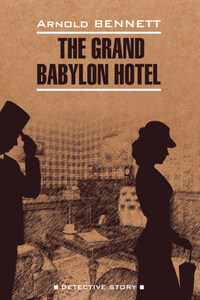Chapter One. The millionaire and the waiter
‘YES, sir?’
Jules, the celebrated head waiter of the Grand Babylon, was bending formally towards the alert, middle-aged man who had just entered the smoking-room and dropped into a basket-chair in the corner by the conservatory. It was 7.45 on a particularly sultry June night, and dinner was about to be served at the Grand Babylon. Men of all sizes, ages, and nationalities, but every one alike arrayed in faultless evening dress, were dotted about the large, dim apartment. A faint odour of flowers came from the conservatory, and the tinkle of a fountain. The waiters, commanded by Jules, moved softly across the thick Oriental rugs, balancing their trays with the dexterity of jugglers, and receiving and executing orders with that air of profound importance of which only really first-class waiters have the secret. The atmosphere was an atmosphere of serenity and repose, characteristic of the Grand Babylon. It seemed impossible that anything could occur to mar the peaceful, aristocratic monotony of existence in that perfectly-managed establishment. Yet on that night was to happen the mightiest upheaval that the Grand Babylon had ever known.
‘Yes, sir?’ repeated Jules, and this time there was a shade of august disapproval in his voice: it was not usual for him to have to address a customer twice.
‘Oh!’ said the alert, middle-aged man, looking up at length. Beautifully ignorant of the identity of the great Jules, he allowed his grey eyes to twinkle as he caught sight of the expression on the waiter’s face. ‘Bring me an Angel Kiss.’
‘Pardon, sir?’
‘Bring me an Angel Kiss, and be good enough to lose no time.’
‘If it’s an American drink, I fear we don’t keep it, sir.’ The voice of Jules fell icily distinct, and several men glanced round uneasily, as if to deprecate the slightest disturbance of their calm. The appearance of the person to whom Jules was speaking, however, reassured them somewhat, for he had all the look of that expert, the travelled Englishman, who can differentiate between one hotel and another by instinct, and who knows at once where he may make a fuss with propriety, and where it is advisable to behave exactly as at the club. The Grand Babylon was a hotel in whose smoking-room one behaved as though one was at one’s club.
‘I didn’t suppose you did keep it, but you can mix it, I guess, even in this hotel.’
‘This isn’t an American hotel, sir.’ The calculated insolence of the words was cleverly masked beneath an accent of humble submission.
The alert, middle-aged man sat up straight, and gazed placidly at Jules, who was pulling his famous red side-whiskers.
‘Get a liqueur glass,’ he said, half curtly and half with good-humoured tolerance, ‘pour into it equal quantities of maraschino, cream, and crème de menthe. Don’t stir it; don’t shake it. Bring it to me. And, I say, tell the bar-tender—’
‘Bar-tender, sir?’
‘Tell the bar-tender to make a note of the recipe, as I shall probably want an Angel Kiss every evening before dinner so long as this weather lasts.’
‘I will send the drink to you, sir,’ said Jules distantly. That was his parting shot, by which he indicated that he was not as other waiters are, and that any person who treated him with disrespect did so at his own peril.
A few minutes later, while the alert, middle-aged man was tasting the Angel Kiss, Jules sat in conclave with Miss Spencer, who had charge of the bureau of the Grand Babylon. This bureau was a fairly large chamber, with two sliding glass partitions which overlooked the entrance-hall and the smoking-room. Only a small portion of the clerical work of the great hotel was performed there. The place served chiefly as the lair of Miss Spencer, who was as well known and as important as Jules himself. Most modern hotels have a male clerk to superintend the bureau. But the Grand Babylon went its own way. Miss Spencer had been bureau clerk almost since the Grand Babylon had first raised its massive chimneys to heaven, and she remained in her place despite the vagaries of other hotels. Always admirably dressed in plain black silk, with a small diamond brooch, immaculate wrist-bands, and frizzed yellow hair, she looked now just as she had looked an indefinite number of years ago. Her age—none knew it, save herself and perhaps one other, and none cared. The gracious and alluring contours of her figure were irreproachable; and in the evenings she was a useful ornament of which any hotel might be innocently proud. Her knowledge of Bradshaw, of steamship services, and the programmes of theatres and music-halls was unrivalled; yet she never travelled, she never went to a theatre or a music-hall. She seemed to spend the whole of her life in that official lair of hers, imparting information to guests, telephoning to the various departments, or engaged in intimate conversations with her special friends on the staff, as at present.
‘Who’s Number 107?’ Jules asked this black-robed lady.
Miss Spencer examined her ledgers.










